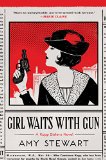Summary | Excerpt | Reading Guide | Discuss | Reviews | Beyond the Book | Readalikes | Genres & Themes | Author Bio

1
Our troubles began in the summer of 1914, the year I turned thirty-five. The Archduke of Austria had just been assassinated, the Mexicans were revolting, and absolutely nothing was happening at our house, which explains why all three of us were riding to Paterson on the most trivial of errands. Never had a larger committee been convened to make a decision about the purchase of mustard powder and the replacement of a claw hammer whose handle had split from age and misuse.
Against my better judgment I allowed Fleurette to drive. Norma was reading to us from the newspaper as she always did.
"'Man's Trousers Cause Death,' " Norma called out.
"It doesn't say that." Fleurette snorted and turned around to get a look at the paper. The reins slid out of her hands.
"It does," Norma said. "It says that a Teamster was in the habit of hanging his trousers over the gas jet at night but, being under the influence of liquor, didn't notice that the trousers smothered the flame."
"Then he died of gas poisoning, not of trousers."
"Well, the trousers —"
The low, goosey cry of a horn interrupted Norma. I turned just in time to see a black motor car barreling toward us, tearing down Hamilton and picking up speed as it crossed the intersection. Fleurette jumped up on the footboard to wave the driver off.
"Get down!" I shouted, but it was too late.
The automobile hit us broadside, its brakes shrieking. The sound of our buggy shattering was like a firecracker going off in our ears. We tumbled over in a mess of splintered wood and bent metal. Our harness mare, Dolley, faltered and went down with us. She let out a high scream, the likes of which I had never heard from a horse.
Something heavy pinned my shoulder. I reached around and found it was Norma's foot. "You're standing on me!"
"I am not. I can't even see you," Norma said.
Our wagon rocked back and forth as the motor car reversed its engine and broke free of the wreckage. I was trapped under the overturned rear seat. It was as dark as a coffin, but there was a dim shape below me that I believed to be Fleurette's arm. I didn't dare move for fear of crushing her.
From the clamor around us, I gathered that someone was trying to rock the wagon and get it upright. "Don't!" I yelled. "My sister's under the wheel." If the wheel started to turn, she'd be caught up in it.
A pair of arms the size of tree branches reached into the rubble and got hold of Norma. "Take your hands off me!" she shouted.
"He's trying to get you out," I called. With a grunt, she accepted the man's help. Norma hated to be manhandled.
Once she was free, I climbed out behind her. The man attached to the enormous arms wore an apron covered in blood. For one terrible second, I thought it was ours, then I realized he was a butcher at the meat counter across the street.
He wasn't the only one who had come running out when the automobile hit us. We were surrounded by store clerks, locksmiths, grocers, delivery boys, shoppers — in fact, most of the stores on Market Street had emptied, their occupants drawn to the spectacle we were now providing. Most of them watched from the sidewalk, but a sizable contingent surrounded the motor car, preventing its escape.
The butcher and a couple of men from the print shop, their hands black with ink, helped us raise the wagon just enough to allow Fleurette to slide clear of the wheel. As we lifted the broken panels off her, Fleurette stared up at us with wild dark eyes. She wore a dress sheathed in pink taffeta. Against the dusty road she looked like a trampled bed of roses.
"Don't move," I whispered, bending over her, but she got her arms underneath herself and sat up.
"No, no, no," said one of the printers. "We'll call for a doctor."
Excerpted from Girl Waits with Gun by Amy Stewart. Copyright © 2015 by Amy Stewart. Excerpted by permission of Houghton Mifflin Harcourt. All rights reserved. No part of this excerpt may be reproduced or reprinted without permission in writing from the publisher.
Your guide toexceptional books
BookBrowse seeks out and recommends the best in contemporary fiction and nonfiction—books that not only engage and entertain but also deepen our understanding of ourselves and the world around us.